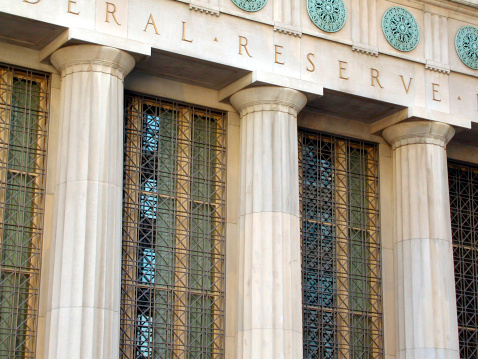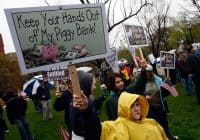Bill Gross, who has been frequently referred to as the Bond King for years now, is out with his monthly outlook. He may be at Janus Capital Group Inc. (NYSE: JNS) now, rather than acting as the fixed income head of PIMCO, but he is still widely followed by investors and economists.
Gross often has many colorful expressions and references that are sometimes hard to follow. The main point of his outlook in September is rather simple: Get the Federal Reserve to raise rates, but just once and then go away for some time.
Gross noted that size does seem to matter in the financial markets, and the super-size August movements in global stocks were a sign that something may be amiss in the global economy itself. Now Gross maintains that the timing and the eventual size of the Fed’s rate hike cycle now seems to be destined to be labeled “too little, too late.”
Gross thinks the Fed lost its chance to raise rates very much, and a neutral policy rate of closer to 2% now cannot be approached without spooking markets further and creating self-inflicted financial instability. Gross is calling for the Fed to hike in the coming September meeting, but he thinks their language needs to be very careful and point to the “one and done” hike so many economists have been discussing. The “done” was meant to mean at least for the next six months.
As far as what to invest in now, it is rather underwhelming. Gross said that cash or “near cash” via one- to two-year corporate bonds are his best idea of appropriate risks/reward investments. As you are probably aware, no one gets rich investing in short-term maturities in bonds of any class.
ALSO READ: 4 Stocks to Sell Now, Until the Fed Acts
The rest of Gross’s commentary and outlook, edited down, is below:
The Fed is beginning to recognize that 6 years of zero bound interest rates have negative influences on the real economy — it destroys historical business models essential to capitalism such as pension funds, insurance companies, and the willingness to save money itself. If savings wither then so too does its Siamese Twin — investment — and with it, long term productivity — the decline of which we have seen not just in the U.S. but worldwide.
But this imbalance between savings/investment and consumption is not the only Frankenstein creation that zero percent yields have created. Over the past 6 years and perhaps on average since the beginning of the 21st century, artificially low yields have propelled financial markets and have impacted the real economy in numerous ways which are not well discussed in the financial press nor certainly in Washington, London, Brussels, or Tokyo. I list them below without further elaboration if only because of space constraints. Keeping it short in this case is the right policy.
The global economy’s finance based spine is so out of whack that it is in need of a major readjustment. In this case, even the best of chiropractors could not even attempt it. Nor would a one off Fed Fund increase straighten it out. Major global policy shifts — all in the same direction — are required that emphasize government spending as opposed to austerity and that recognize that competitive devaluations do nothing but allow temporary respite from the overreaching global problem of “too little aggregate demand” versus “too much aggregate supply.” It is demand that must be increased — yes China must move more quickly to a consumer based economy — but the developed world must play its part by abandoning its destructive emphasis on fiscal austerity, and begin to replace its rapidly decaying infrastructure that has been delayed for decades.
What to do as an investor? Recognize that the above recommendations are politically Pollyannaish. The Merkel dominated EU will not change any time soon, nor will Bernie Sanders be elected U.S. President. Global fiscal (and monetary) policy is not now constructive nor growth enhancing, nor is it likely to be. If that be the case, then equity market capital gains and future returns are likely to be limited if not downward sloping. High quality global bond markets offer little reward relative to durational risk. Private equity and hedge related returns cannot long prosper if global growth remains anemic …
In the long run though, the return of your money will likely not pay for college, healthcare, or retirement liabilities. That is the near global conundrum we are faced with as near zero percent interest rates limit capital gains in the future, and if raised too high, will lead to redzone losses. Not much else to say here. Finance based capitalism with its zero bound interest rates has now produced global imbalances that impair productive growth and with it the chances for “old normal” prosperity. Whether you are tall or short, or your portfolio big or small (better to be big!), they’re not going up as much as you hope they would over the foreseeable future.
ALSO READ: 4 Stocks to Avoid If Inflation Heats Up
100 Million Americans Are Missing This Crucial Retirement Tool
The thought of burdening your family with a financial disaster is most Americans’ nightmare. However, recent studies show that over 100 million Americans still don’t have proper life insurance in the event they pass away.
Life insurance can bring peace of mind – ensuring your loved ones are safeguarded against unforeseen expenses and debts. With premiums often lower than expected and a variety of plans tailored to different life stages and health conditions, securing a policy is more accessible than ever.
A quick, no-obligation quote can provide valuable insight into what’s available and what might best suit your family’s needs. Life insurance is a simple step you can take today to help secure peace of mind for your loved ones tomorrow.
Click here to learn how to get a quote in just a few minutes.
Thank you for reading! Have some feedback for us?
Contact the 24/7 Wall St. editorial team.


